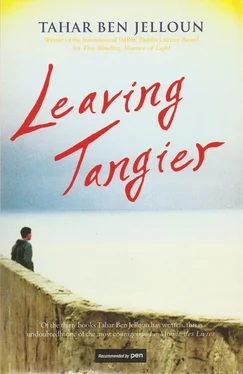Tahar Ben Jelloun - Leaving Tangier
Здесь есть возможность читать онлайн «Tahar Ben Jelloun - Leaving Tangier» весь текст электронной книги совершенно бесплатно (целиком полную версию без сокращений). В некоторых случаях можно слушать аудио, скачать через торрент в формате fb2 и присутствует краткое содержание. Год выпуска: 2009, Издательство: Arcadia Books, Жанр: Современная проза, на английском языке. Описание произведения, (предисловие) а так же отзывы посетителей доступны на портале библиотеки ЛибКат.
- Название:Leaving Tangier
- Автор:
- Издательство:Arcadia Books
- Жанр:
- Год:2009
- ISBN:нет данных
- Рейтинг книги:5 / 5. Голосов: 1
-
Избранное:Добавить в избранное
- Отзывы:
-
Ваша оценка:
- 100
- 1
- 2
- 3
- 4
- 5
Leaving Tangier: краткое содержание, описание и аннотация
Предлагаем к чтению аннотацию, описание, краткое содержание или предисловие (зависит от того, что написал сам автор книги «Leaving Tangier»). Если вы не нашли необходимую информацию о книге — напишите в комментариях, мы постараемся отыскать её.
Leaving Tangier — читать онлайн бесплатно полную книгу (весь текст) целиком
Ниже представлен текст книги, разбитый по страницам. Система сохранения места последней прочитанной страницы, позволяет с удобством читать онлайн бесплатно книгу «Leaving Tangier», без необходимости каждый раз заново искать на чём Вы остановились. Поставьте закладку, и сможете в любой момент перейти на страницу, на которой закончили чтение.
Интервал:
Закладка:
‘I have a tree inside me,
A sapling I brought back from the sun;
Fish of fire, its leaves sway gently,
Its fruits warble away like birds.
‘The man looked at me, laughed, and repeated, “Its fruits warble away …” Then he held out his hand and said, “You, you’re no moro !” To him, that was a compliment.’
‘I can never understand this hatred of Arabs.’
As Kenza listened to Nâzim, hanging on his every word, she felt her fatigue melt away. She no longer wanted to go home. The night was mild; they took a walk, holding hands. He spoke to her about the Moorish reign in Andalusia, that time when Muslims and Jews composed music and poetry together in lovely symbiosis.
24 . Kenza and Nâzim
THE KEBAB WAS CLOSED on Mondays. Kenza asked her supervisor for the day off and went to meet Nâzim at the train station café. They had decided to spend the day together in a small village a half hour from Barcelona. To get acquainted, talk without being rushed, and enjoy a kind of holiday mood. Nâzim was charming and elegant. Having arrived early, he observed the travellers; strangely enough, they all seemed alike in a curious way: they dashed about, bumped into one another, and seemed distracted. Luckily, an African family had just gotten off the train, and their colourful presence brought to the grey drabness of the station a breath of desert wind, an air of gaiety, a music that made one long to dance. While he was waiting, Nâzim went over to these happy visitors, so delighted to be there. They were from Mali, by way of Morocco, and they were not immigrants, not invaders, as the father of the family told Nâzim.
‘Allow me to present myself: I am Professor Mohammed Touré, osteopath, invited here by the dean of the medical school in Barcelona to give a series of lectures. My wife is a pediatrician, and she has come to see the Red Cross organization about a programme it’s developing for Western Africa. Our children often accompany us in our moves. Two months ago, we were all in Princeton, it was most interesting. The only problem was that everyone spoke English, a language I understand but do not speak, whereas I studied Castilian Spanish a long time ago in school. And you, what do you do?’
As Nâzim introduced himself, he caught sight of Kenza looking around for him. Monsieur Touré gave him his card, saying, ‘If you ever visit Mali, call me, whether or not you need an osteopath!’ The family’s bright colours vanished from the main concourse of the station. And Kenza had disappeared. The crowd seemed even more dense and grey than before — at least that’s how Nâzim now saw the world. Was he seeing things, or simply dismayed and disappointed? Yet he was sure he’d glimpsed Kenza only a moment earlier and hurried anxiously this way and that, no longer seeing anything. Returning to the café, he ordered some sparkling water.
Kenza appeared abruptly in a flowered dress, as if popping from a magician’s box. Leaning over Nâzim, she murmured, ‘Let’s not waste any time.’
They sat face to face in the train, looking at each other, saying nothing. She thought he seemed nervous, and wondered why. Perhaps he’d been shocked by her boldness… When he looked at her, she felt a strange sweetness steal over her. He had beautiful hands, large yet graceful. She studied his full lips and imagined herself biting them. She laughed. He asked her why. ‘Ah, my friend, if only you knew!’ He couldn’t guess what she’d meant and did not dare look at her shapely bosom, her laughing brown eyes, her long, thick tresses, her legs, her mouth.
Since arriving in Spain, Nâzim had gone out with only two women. The first was a compatriot who thought she had found in him a husband and a father for the child she was raising on her own. Their relationship had been brief and stormy. The second woman was Cuban, an office worker who had left her country after falling in love with a Spanish professor who’d come to lecture at the University of Havana. When her visa had expired, she’d refused to go back home and had become an illegal alien like thousands of immigrants from Morocco and Latin America. The bond between her and Nâzim had been purely sexual, and after a few months they had parted without rancor. Ever since, Nâzim had been looking for a woman more familiar with his culture. He needed to hear the Turkish language, or at least Arabic, and he wanted to thrill to the music of his country, to share thoughts and feelings. Kenza was everything he wanted. Although she looked like a Southern European, she was an Arab, unattached, beautiful, and above all a legal resident of Spain. Secretly, Nâzim hoped to take advantage of Kenza’s status to straighten out his own situation. He was tired of living underground. He was careful not to mention all that, however, not wanting to seem like a selfish and crass opportunist.
At the small station in Sabadell, the police were checking identity papers, systematically stopping gypsies, black Africans, and North African Arabs. Taking her companion’s arm, Kenza advanced confidently. Nâzim was frightened for a moment, but seeing how sure of herself Kenza was, he squeezed her hand tightly, as if in thanks.
They kissed on the sidewalk. Nâzim was embarrassed, Kenza not at all. She was the one who pulled him close to press her lips to his. Moved and pleased, he blushed like an adolescent. He suggested that they go have a café au lait, but she refused: what she liked was iced Viennese coffee.
Then Kenza decided to take the lead. A liberated — and determined — woman, she rose and told him, ‘Follow me, we’re going to spend the day at the Bristol, a charming small hotel, you’ll see.’
It had been more than a year since she’d touched a man’s skin. She undressed Nâzim and licked his body while smelling it as if it were a flower, sniffing, caressing, sucking. He let her do as she pleased, and wondered when he should reassert himself. When he did get on top of her, she pulled him towards her with all her strength, saying, ‘Crush me, I want to feel your whole weight on me — I don’t want to lose anything of your body: I want it inside me, deeply, completely.’
They made love as if famished for it. She spoke to him in the Arab dialect of Tangier, and he answered her in Turkish. The sounds of their native tongues aroused them. Going into the bathroom, Kenza sang as she danced a few steps; Nâzim had seen her extraordinary skill as a dancer, which lent an erotic note to her slightest movement, and she picked that moment to confess to him that twice a week she performed at a restaurant called L’Huile d’Olive. He would have liked to tell her that he’d already seen her dance, but preferred not to have to explain how and why.
On the trip home they barely spoke, wrapped in a fine fatigue and completely absorbed in their sense of each other.
25 . Azel
THE SLAP KNOCKED AZEL down and left him stunned. He had never imagined that one day Miguel would hit him. It even took him a moment or two to realize what was happening. When he stood up, Carmen brought him his suitcase and pointed to the door. She had warned Miguel many times about the way his protégé sometimes behaved, but until now her employer had always smiled and gestured helplessly. That was back when he was still in love.
Azel understood that this time he could not talk his way out of trouble. He had gone too far, had broken his word, and was only getting what he deserved. So he headed for the door without protest, mumbling that he would return for his suitcase. Carmen held out her hand for his house keys. Azel hesitated for an instant before fumbling through his pockets; pulling out a set of keys, he placed them on the table in the front hall. There was suddenly something pathetic about the look in his eyes, but Carmen nodded and turned on her heel as though he were already gone. Miguel had retreated to his room; he was about to go to Madrid to prepare an important exhibition of works by a great hyperrealist painter, Claudio Bravo, the artist’s first show in his native Spain in fifteen years, but Miguel was waiting for Azel to be out of the house before he left on his trip. He did not like confrontations, and had left Carmen in charge of such proceedings several times before. Miguel justified his cowardice by convincing himself that a new argument with his lover wouldn’t change anything. Their last fight had almost turned nasty. When thwarted, Miguel became vulgar and mean; in such moments, his Barcelona street-tough side — which he detested and repressed — would abruptly reemerge. He was then capable of striking his antagonist with the first sharp object he could lay hands on. And Azel’s behaviour was exactly the sort to provoke him to such violence.
Читать дальшеИнтервал:
Закладка:
Похожие книги на «Leaving Tangier»
Представляем Вашему вниманию похожие книги на «Leaving Tangier» списком для выбора. Мы отобрали схожую по названию и смыслу литературу в надежде предоставить читателям больше вариантов отыскать новые, интересные, ещё непрочитанные произведения.
Обсуждение, отзывы о книге «Leaving Tangier» и просто собственные мнения читателей. Оставьте ваши комментарии, напишите, что Вы думаете о произведении, его смысле или главных героях. Укажите что конкретно понравилось, а что нет, и почему Вы так считаете.












